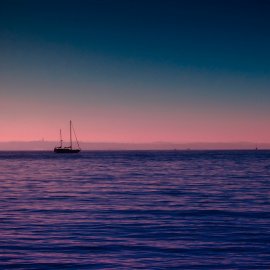The Privilege of Nature
-
English
-
ListenPause
Welcome to World Ocean Observatory…
I’m Peter Neill, Director of the World Ocean Observatory.
I recently completed a three-week voyage under sail, along the coast of Nova Scotia and return. It was not a mighty ocean passage, although it was out of sight of land often and subject to changes in weather and wind that provided at least a suggestion of what it might have been to have made such voyages in the past without a modern vessel and all the navigational technology that provides you a helpful method to fix your place in ocean space and time.
The time was long enough to forget about work left behind ashore, to enjoy a truly relaxing emptiness of mind, and to not start to worry about work to come until I was a few days back and realized there were things that needed doing and I’d best get started.
We anchored almost always in remote coves with no houses ashore and no other boats nearby. There was a profound silence – at least an absence of the kinds of sound we hear in urban and suburban places. There we all sorts of noises of course – the changing velocities of the wind, the waves ashore on mud banks or granite rocks, the calls of the various birds, the loon of course, but others, not such novel hearings, but different, isolated, evocative, nonetheless.
What struck me in those places was the extraordinary privilege of being there. Of being distant, remote, private, untrammelled by the hard sounds of modern living. There was not even the tap-tap sound of keyboards and hand devices, sending forth assertions of where we were, or what we were doing. The choice was to write observations down or to make a mental note of the feeling, not so much with words, but remembered sentiments or observations.
The privilege of being in Nature: On land, the last great luxury is privacy. People pay millions for the illusion of being separate, behind walls, in protected communities. Natural experience is a private garden, city park, a run or bike along a designated path. We cram the national parks; we bring nature home as plants and flowers grown industrially far away, as brochures for eco-travels to packaged encounters, as books and films that provide projections of nature, glorious to imagine, but not real. We bemoan the loss of nature, contact with nature, even as we lament its spoilage and decline.
An ocean experience is different, sensuously, psychologically, and evocatively. The wildness, even of a crowded beach, is evident of light and motion and feeling. The ocean is empty—full simultaneously; it scares us and fills our hearts with joy. It is vast and empty, as close as a tide pool, or as deep and fulsome, filled with marine creatures.
The privilege I felt in my ocean place was stunning, overwhelming. I felt guilt and exultation. I was there, so many were not, and would never see or know what I did there. How could I share my feeling? How could I act more effectively to protect such places for others to discover? How could I resist the terrifying and relentless forces of consumption, of extraction and exploitation of nature, of the pollution and destruction of nature? These challenges quietly crystallized into a noisy conclusion and high resolve.
I have written elsewhere:
“Reciprocity is a state of mutual exchange, the categorization of an action by it motivation and consequence in relationship to another. What if we accept the power of reciprocity as an additional standard of behavior at all levels, in all areas of exchange with Nature? What if we acknowledge that the land and the sea provide us value, not for the taking and exhausting as an entitlement, but as the giving of a gift, the making of a loan, with a consequent obligation that we pay back that value through complementary behavior, equitable patterns of consumption, and forms of exchange that sustain the capacity of Nature through accepted connection to ourselves, our children, and the public good?”In that distant anchorage, isolation and privilege were transformed into renewed commitment for engagement and action for the protection and understanding of Nature as the primeval force for self-improvement, community development, and social advancement, as a universal, democratic, equitable force for everyone. My commitment was to the ocean. My privilege. The sea connects all things.
We will discuss these issues, and more, in future editions of World Ocean Radio.
WORLD OCEAN RADIO IS DISTRIBUTED BY THE PUBLIC RADIO EXCHANGE AND THE PACIFICA NETWORK IN ASSOCIATION WITH WERU-FM, BLUE HILL, MAINE. FIND OUR PODCAST ON ITUNES, AND AT WORLD OCEAN OBSERVATORY DOT ORG.
After a recent three-week sailing voyage in the North Atlantic, host Peter Neill returns to World Ocean Radio to share observations from being in a distant ocean environment, and how important it is for us to commit to action for protection of the natural places that improve and sustain us.
About World Ocean Radio
Peter Neill, Director of the World Ocean Observatory and host of World Ocean Radio, provides coverage of a broad spectrum of ocean issues from science and education to advocacy and exemplary projects. World Ocean Radio, a project of the World Ocean Observatory, is a weekly series of five-minute audio essays available for syndicated use at no cost by college and community radio stations worldwide. A selection of episodes is also available in Portuguese, Spanish, French, Swahili, and Mandarin, enabling us to reach 75% of the world's population. For more information, visit WorldOceanObservatory.org/world-ocean-radio-global.
Image Credit
Bari Glew for Unsplash
- Login to post comments



